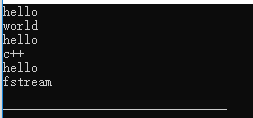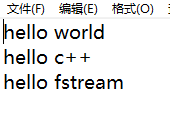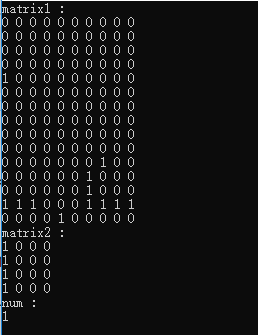c++ Text Read-Write
Method Steps
- Reference header file < fstream >
- Create Stream Object
- Specify the file and how to open it
- Read and write data
- Close File
Stream Object
ofstream:Write output data from memory to file ifstream:Read operations enter data from a file into memory fstream:read and write operations
Open Mode
Open Mode ios::in Open file for reading ios::out Opens a file for writing ios::ate is initially at the end of the file ios::app. Append Write File ios::trunc If the file exists, delete it before creating it ios::binary Open File Binary There are several ways to open a file | connections, such as ios::out | ios::trunc
Code Samples
/*
20190918
c++ File Operation
*/
#include <iostream>
using namespace std;
#include <string>
//header file
#include <fstream>
/*
Open Mode
ios::in Open file for reading
ios::out Open a file for writing
ios::ate Initial position is at end of file
ios::app Write files by appending
ios::trunc If the file exists, delete it before creating it
ios::binary Open file binary
Multiple ways to open files available | Connect
*/
void writeToFile(){
//Output data from memory to file
//1. Include header file <fstream>
//2. Create Stream Objects
ofstream ofs;
//3. Specify how to open
ofs.open("text.txt", ios::out | ios::trunc);
//4. Write data
ofs <<"hello world"<<endl;
ofs <<"hello c++"<<endl;
ofs <<"hello fstream"<<endl;
//5. Close the file
ofs.close();
}
void readFile(int method){
//Enter data from a file into memory
//1. Create Stream Objects
ifstream ifs;
//2. Specify how to open the file
ifs.open("text.txt", ios::in);
//3. Determine if the file was opened successfully
if( !ifs.is_open() ){
cout <<"File Open Failed"<<endl;
return;
}
//4. Read Data
switch(method){
case 1:{
//Method 1
char buf[1024] = {0};
while(ifs >> buf){ //Space Output
cout <<buf <<endl;
}
break;
}
case 2:{
//Method 2
char buf2[1024] = {0};
while(ifs.getline(buf2, sizeof(buf2))){ //Read the whole line
cout <<buf2 <<endl;
}
break;
}
case 3:{
//Method 3
string buf3;
while(getline(ifs, buf3)){ //Read the whole line
cout <<buf3 <<endl;
}
break;
}
case 4:{
//Method 4
char c;
while((c = ifs.get()) != EOF){ // End Of File
cout <<c;
}
break;
}
default:{
cout <<"method is wrong"<<endl;
break;
}
}
//5. Close the file
ifs.close();
}
int main(){
//Write File
writeToFile();
//read file
int method = 2;
readFile(method);
return 0;
}
Code explanation:
There are four ways to write files, and students who have tested them personally will find that their output is different.Method 1 reads a space or a line break and outputs it; both methods 2 and 3 read a line and then output it; and method 4 outputs every character read, so line breaks are not read until a line break is read.
The results are as follows
Method 1:

Methods 2, 3, 4:

Storage in text.txt text:

Application Instances
Read a 20-line text file consisting of numbers, read the first 15 lines of data into matrix1[15][10], lines 16 to 19 into matrix2[4][4], and lines 20 into num.
The text file is as follows:
0 0 0 0 0 0 0 0 0 0 0 0 0 0 0 0 0 0 0 0 0 0 0 0 0 0 0 0 0 0 0 0 0 0 0 0 0 0 0 0 1 0 0 0 0 0 0 0 0 0 0 0 0 0 0 0 0 0 0 0 0 0 0 0 0 0 0 0 0 0 0 0 0 0 0 0 0 0 0 0 0 0 0 0 0 0 0 0 0 0 0 0 0 0 0 0 0 0 0 0 0 0 0 0 0 0 0 1 0 0 0 0 0 0 0 0 1 0 0 0 0 0 0 0 0 0 1 0 0 0 1 1 1 0 0 0 1 1 1 1 0 0 0 0 1 0 0 0 0 0 1 0 0 0 1 0 0 0 1 0 0 0 1 0 0 0 1
The code is as follows:
/*
20190919
Read File Instances
*/
#include <iostream>
using namespace std;
#include <fstream>
int matrix1[15][10];
int matrix2[4][4];
int num;
int main(){
//Create Stream Object
ifstream ifs;
//Determine how to open
ifs.open("data.txt", ios::in);
if(!ifs.is_open()){
cout <<"File open failed!!"<<endl;
return 0;
}
//Read Data
int temp_num;
for(int i=0; i<15; i++){
for(int j=0; j<10; j++){
if(ifs >> temp_num){
matrix1[i][j] = temp_num;
}
}
}
for(int i=0; i<4; i++){
for(int j=0; j<4; j++){
if(ifs >> temp_num){
matrix2[i][j] = temp_num;
}
}
}
if(ifs >> temp_num){
num = temp_num;
}
//Close File
ifs.close();
//output data
cout <<"matrix1 :"<<endl;
for(int i=0; i<15; i++){
for(int j=0; j<10; j++){
cout <<matrix1[i][j]<<" ";
}
cout <<endl;
}
cout <<"matrix2 :"<<endl;
for(int i=0; i<4; i++){
for(int j=0; j<4; j++){
cout <<matrix2[i][j]<<" ";
}
cout <<endl;
}
cout <<"num :"<<endl;
cout <<num<<endl;
}
Experimental results:
